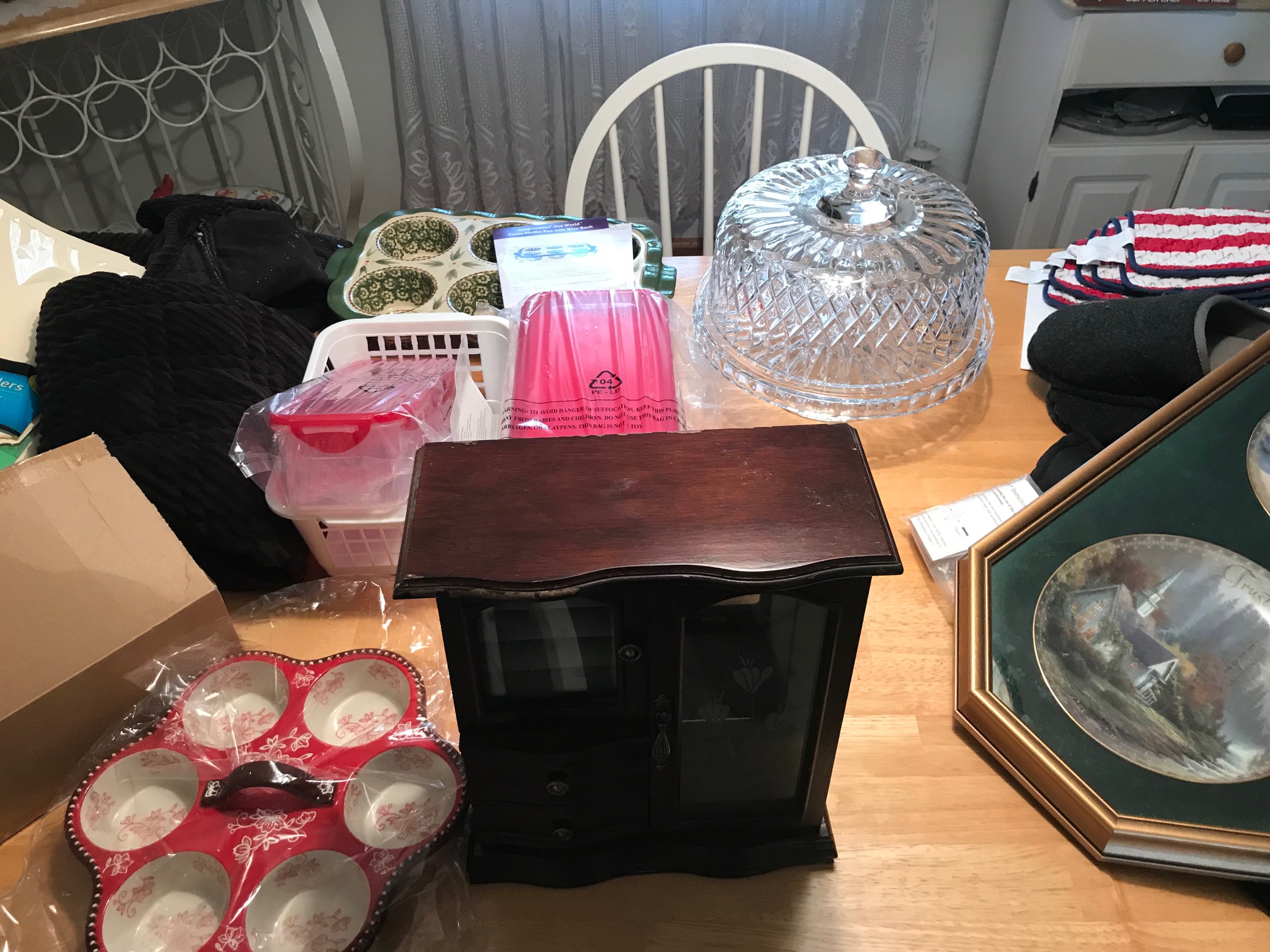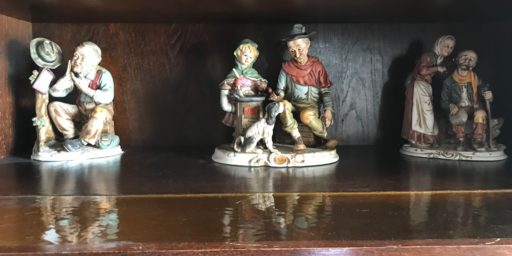Dad’s Stuff is Junk, Grandma’s Stuff is Treasure?
Does trash become treasure with time?

In the discussion thread on yesterday’s “Death Cleaning” post, Dave Schuler observed:
Fashions change. Young people today may think it’s junk but in 10, 20 years their views may not be the same.
What you consider junk the girls may think is just wonderful. That’s frequently the case. Dad’s stuff is junk; Grandma’s stuff is a treasure.
I suspect I am the only person here who was at one time an antique dealer. Contrary to what was said above, practically everything increases in value with age, especially when it turns 100. The earliest cracker jack prizes were nearly valueless—value of less than a cent. Now some are worth $10 apiece. Increasing in value 10,000 fold ain’t bad. Glass and dishes that were sold in the dime store a century ago may be worth hundreds or even more today.
I really wish I still had that Amazing Fantasy #15.
I think this is true in the abstract but generally not in the particular.
Most obviously, Amazing Fantasy #15 is an extreme outlier. It’s the first appearance of Spiderman, one of the three most iconic superheroes (with Superman and Batman, who preceded him by decades), and was published before the advent of comic book collecting. Only a handful of comic books are of comparable value and books from the last 25 to 30 years are generally worth less in real dollars than they are now.
Presumably, the same is true of such things as Cracker Jack toys: there are extreme examples of items that have wildly increased in price. Beyond that, $10 is a measly return on investment on a 100-plus year wait. Had someone invested $100 in the S&P 500 in 1912, when the first toys were introduced, they’d have $2,182,068.65 today. (Of course, the real value of that is only $88,126.18 in 1913 dollars.)
Beyond that, the vast majority of Grandma’s stuff isn’t actually treasure. While I’m sure there are things from my mother that the girls might like to have when they’re considerably older, I’m reasonably certain that none of what was in those two loads I took to the dump would qualify. Photos of her in her Communion dress? Sure. But I kept those. Ditto, potentially, some of her keepsakes from my childhood. But, again, I kept those that weren’t ruined from neglectful storage practices. But I can’t imagine that they’d be interested in clothes she bought in the last ten years or various crap she ordered off QVC.
There’s some possibility that they might enjoy having the very expensive German walnut cabinet (“Shrank”) we purchased circa 1977. But it’s not worth my going through the considerable expense of moving it to Virginia and then to wherever they’d want it years from now. Much less store it in the interim.
Similarly, they might have enjoyed Mom’s wedding china if she had any. But there’s less likelihood they’d be all that interested in the china, cutlery, and glassware she bought in the late 1990s or early 2000s, long after I’d left the house. And, even if they wanted it, it just doesn’t make sense for me to store it all those years. And I suspect they’d rather have the china that their late mother and I got after our wedding. I’m happy to pass that on to them when they want it, presuming they don’t simply get some of their own when they get married.
The same reasoning applies to my dad. He died when Katie was barely one and before Ellie was conceived, so they never got to know him. But there’s a reasonable chance that they’ll want old photos of him or have interest in his camera or old Army stuff. But, again, I kept all that. His Big Mouth Billy Bass animatronic singing fish with corroded batteries inside? Not so much.
The other thing that occurs to me is that Dave’s experience as an antique dealer may not be predictive of the future. Until quite recently, people had relatively little in the way of material possessions. One only has to look at the homes even people in the upper middle class lived in as recently as the 1970s: they tended to have much less square footage of living space than is common today and the closets were tiny. Furniture tended to be hand-made by local craftsmen. Clothes were either hand-made by the lady of the house or made of relatively expensive materials by local seamstresses and tailors. Nowadays, we live in a disposable society. We have lots of stuff, mostly made in China and other places with cheap labor, and keep buying more. The trade-off is that little of it is made to last.
A commenter on Doug Mataconis’ Facebook page, arguing that the instinct to purge one’s belongings can go overboard, observed:
I just happen to be making the final dive into sorting through my dad’s stuff. He had an entire building of stuff, but I wouldn’t call him a hoarder as it is relatively organized and historical. His collection included hundreds of old family items from as far back as 1775. There are letters that his mother kept from the early 1900s, including some from her brother who was in WWI. It was a pleasure to read those and see a first hand account of those times. There are my dad’s letters from the Korean War. Dozens of them and also interesting. Political memorabilia from his time in political office and running for office. There’s a journal and letters from my grandmother’s aunt who was a school teacher near Wounded Knew when the massacre happened and she documented the events before and afterwards. Ninteenth century newspapers, a vise my great grandfather carried across the Isthmus of Panama at age 16 during his travels to the California Gold Rush, etc. I have box loads of stuff I can sell as antiques and boxes that are going to historical societies. But all I can do is whittle it down to what is still a huge amount, but now it fits into a smaller room.
Maintaining several generations’ worth of treasures in this fashion may beyond the ability of most but what’s noteworthy is how carefully curated the collection is. There are a tiny number of truly representative, meaningful items from each person—with a story that goes along with it and gets passed down. I think that’s what we should be after.






I’m reminded of when our local university wanted me to keep an eye out for the manuscript of my dad’s first book. I had to inform them that we had found it when cleaning out the barn but didn’t think they would want it because the mice had used half to make nests in the other half…
(Also, notice how people who tell you to “hang on to things for the sake of antique dealers and children” never offer to store the stuff for you or pay for the storage? I think the opportunity cost and wear and tear on your nerves is far higher than the minute possibility down the pipeline that your kids/antique dealers would find value in one of the things you stored. You were not put here on this Earth to be the caretaker of junk for future guests on Antiques Roadshow 2100!)
Having recently done an interstate move, 1-800-JUNK is your friend.
After reading this, I thought to myself, ‘Didn’t I see an article or listen to an NPR story about how kids don’t want your stuff?’, and then I googled for it. Didn’t find it, because it was buried in with dozens of other articles about how they don’t want your stuff, they don’t want your brown furniture, and they don’t want your Hummels. This is definitely a class thing though. If you are struggling and you don’t have many nice things, then you would be grateful to inherit a really nice solid wood bedroom set to replace the Walmart particle board crap that has been through too many moves. But for many of us, by the time our parents are passing on we have our own nice things. My wife and I don’t want my mother’s or mother in law’s living room set because we’ve got our own, which we purchased with a great deal of thought and care. I don’t want my mother’s Belleek china because, valuable as it is (was?), it’s not our type of thing. And our kids? They don’t want any of this stuff. Can’t even imagine having it. In the article I didn’t find an antique deal talked about how he used to sell Hummels for $500 each, and now he has to put 3 of them together to get $100. It’s a rare 25 year old that wants one Hummel, much less 40 of them.
I mentioned the previous post to my wife and we thought about what we would actually want from our mothers (both our fathers have already passed). I came up with an 8×10 black and white picture of my Mom from when she first arrived in the US, a professional 3/4 profile. My wife’s was a little more substantial, but it was still only one thing: a Russian Samovar. And it was my wife who first gave it to her parents back in the early 80’s when she was an exchange student in Moscow during the Reagan years. If I remember correctly she traded some jeans for it. It may actually be a worthwhile antique!
I should add that we are starting to deal with this at the moment, which is probably making me acutely aware. Our mothers are still alive, but we have an interesting contrast. After my father past away, my mother purged the house from top to bottom. Every closet, nook and cranny was explored and if it wasn’t something she was actively using, out it went. when we visit there, we spend our time relaxing and maybe doing some repair work here and there. My mother-in-law, on the other hand, has shelves and boxes and piles of stuff everywhere. She has become less and less mobile and every time we go there we spend at least part of the time cleaning something out. These are not, for the most part, strolls down memory lane. Two trips ago I needed to replace the garbage disposal and in preparation I cleaned out under the sink which, because of the kitchen layout, had a lot of inaccessible space. Bottle after can after carton of cleaning supplies, most of which shouldn’t be thrown in the trash, one or two dating back to the Nixon administration. And out of all her siblings my wife is the responsible one, so in the back of my mind whenever we go there is kind of a dread over the mess that will occur when she finally passes and we have to go through the whole house.
Yeah, many of us wrestle with this same conundrum. We haven’t yet completely disposed of unneeded stuff from my mother-in-law (who died in 2006), let alone my parents. Fortunately, I have some cousins who are much less well off financially than we are, so things of value (china, crystal, sterling flatware) can go to them. That still leave us with a lot to get rid of. Like so many other children of WW2 or Korea veterans, we want to hang on to our father’s memorabilia, but that’s only a small portion of the total.
It’s a delicate balance of course. When my grandmother passed away, she had specific pieces of her jewelry slated for each of her granddaughters. Once those pieces were distributed, there was a pile left of what we assumed was mostly costume jewelry, because the remaining pieces weren’t mentioned in the will. We piled it in the center of the dining room table, and my aunt (her daughter), my female cousins, and my sister and mother took turns picking out pieces that we thought were interesting.
My mom picked out one piece, a smallish pin, that she’d wear on occasion. A friend of hers saw it and asked where she’d gotten it, and then encouraged her to have it appraised. It turned out to be an actual piece of fine Art Deco jewelry, not costume jewelry, and was appraised for thousands.
That type of find is going to be few and far between. The question is how much time one is willing to invest to find out.
One, I’d have an antiques dealer look at the old junk, just in case. People tend not to know what old stuff is worth, or even whether it’s junk at all.
Two, let others look at some of the junk and see if they find something they like or want. I have three old plastic bowls, two are burned and scarred in spots, which I find invaluable for holding chopped vegetables and meat when I cook. they’re narrow at the bottom, and widen to wider than a dinner plate at the top, with nice depth. they’re also good for holding snacks now and then. I think they’re like over forty years old.
They’re junk, I don’t expect anyone else would want them, but I’m not throwing them away.
One of the reasons that “rare issues of old comics” and “rare issues of old SF magazines” are rare is because the publishers inadvertently invented biodegradability, with the logical result. As Arthur C. Clarke said in his autobiography about not mourning the loss of his childhood SF magazine collection: “if the magazines didn’t instantaneously disintegrate into a handful of fluff upon being picked up, you would be at risk for instant tetanus from the rusty staples.”
@MarkedMan: In the case of Belleek, it’s was. My mom decided to collect Belleek tea sets. When she passed away, the company that cleared out her apartment at the retirement center she was living at told me that there was sooooooo much Belleek in Seattle that only Red and Black label (mark) Belleek had much collector value. Even so, two or three of the sets were unique enough that the company found customers for them. None of my cousin’s children wanted any of it. Too fragile to ship cross country (the girls live in Alexandria,VA now).
Most beautiful tchotckke in the world, but still tchotcke and is a “buy at retail sell and wholesale” thing unless you reeeealy love to sell on E-bay.
One man’s junk is another man’s treasure. The last time we moved I filled half our front yard with stuff we did not need and I did not want to move. Then I put a sign up:
“FREE STUFF- PLEASE TAKE”
It was all gone in 24 hours.
Depends a lot on your grandmother doesn’t it? If she collected junk there isn’t going to be much worth keeping. If she collected good stuff then there will be stuff worth keeping. Also depends on the economic status of the kids and grandkids. Overall, for most people I think it will mostly be stuff that gets tossed out.
Steve
I have a set of encyclopedias. They are in very good condition and attractive on bookshelves. Yet I will most likely take them down to a thriftshop. No one wants them, and they are very heavy. I paid about $700 for them new back in the 1970’s.
My relative has some original Elvis Presley record albums. They are worth a lot of money.
There is a lesson there somewhere.
SARAH CYNTHIA SYLVIA STOUT
by Shel Silverstein
Sarah Cynthia Sylvia Stout
Would not take the garbage out.
She’d wash the dishes and scrub the pans Cook the yams and spice the hams,
And though her parents would scream and shout, She simply would not take the garbage out. And so it piled up to the ceiling:
Coffee grounds, potato peelings,
Brown bananas and rotten peas,
Chunks of sour cottage cheese.
It filled the can, it covered the floor,
It cracked the windows and blocked the door, With bacon rinds and chicken bones, Drippy ends of ice cream cones,
Prune pits, peach pits, orange peels, Gloppy glumps of cold oatmeal,
Pizza crusts and withered greens,
Soggy beans, and tangerines,
Crusts of black-burned buttered toast, Grisly bits of beefy roast.
The garbage rolled on down the halls,
It raised the roof, it broke the walls,
I mean, greasy napkins, cookie crumbs, Blobs of gooey bubble gum, Cellophane from old bologna, Rubbery, blubbery macaroni,
Peanut butter, caked and dry,
Curdled milk, and crusts of pie,
Rotting melons, dried-up mustard, Eggshells mixed with lemon custard,
Cold French fries and rancid meat, Yellow lumps of Cream of Wheat.
At last the garbage reached so high
That finally it touched the sky,
And none of her friends would come to play, And all of her neighbors moved away;
And finally, Sarah Cynthia Stout
Said, “Okay, I’ll take the garbage out!”
But then, of course it was too late,
The garbage reached across the state, From New York to the Golden Gate;
And there in the garbage she did hate
Poor Sarah met an awful fate
That I cannot right now relate
Because the hour is much too late
But children, remember Sarah Stout,
And always take the garbage out.
(2020 Campaign slogan for the Democrats?)
I go to estate sales, after a neighbor took me to me first one 10 years ago. Boy do they vary. Lowest end, “Digger” sales (wear gloves) where the cats pissed all over everything (or bachelor living above shop/garage and lots of weird porn that the company tried to hide but failed).
Living near an Army/USAF base, lots of Asian wife houses of late in a nice area (outlived him by 30+ years – rice cooker, weird dolls), or German wife (outlived him by 10 years – Schrunk, Hummels). A year ago I went to a sale in an upscale neighborhood to find friends who had just bought a new house had bought a huge Shrunk, so I helped them load it and followed them to them to the new house (Nope on unloading it). Then there are the high end sales. Craziest one was a lakeside estate of a Madame, as in whore house. This house was never used for whatever, but the 1.5x life size statues and huge paintings would not have fit into my front door. Rumor is the folks that bought the water-front estate found more gold/silver than their purchase price in the back yard (um, over $750K). Silver, I do know of a case where the Estate service did find about 35K in silver bars in the basement and turned it over to the family without commission (standard here is 1/3 commission).
My parents downsized years ago (1993 move) and gave away a tapestry I wanted, but kept the Brunswick record player from my Great-grandmother.
Bad collectable include whiskey decanters, Spoons, and thimbles.
Anyway estatesales.net